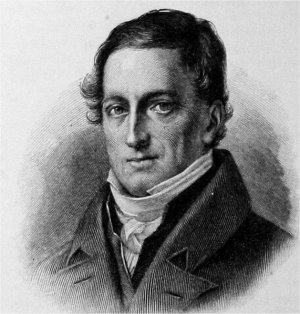<Back to Index>
- Philosopher Johann Friedrich Herbart, 1776
- Architect Carlo Rainaldi, 1611
- 4th Qing Emperor of China Kangxi, 1654
PAGE SPONSOR

Johann Friedrich Herbart (May 4, 1776, Oldenburg, Oldenburg – August 11, 1841, Göttingen, Hanover) was a German philosopher, psychologist, and founder of pedagogy as an academic discipline.
Herbart
is now remembered amongst the post-Kantian philosophers mostly as
making the greatest contrast to Hegel; this in particular in relation
to aesthetics. That does not take into account his thought on education. Herbart
was born at Oldenburg. Growing up as a fragile child because of an
unfortunate accident, Herbart was taught by his mother at home until
the age of 12. He continued his schooling at the Gymnasium for six years, and showed interest in philosophy, logic, and Kant's work involving the nature of knowledge obtained from experience with reality. His education then continued at Jena, whereupon he studied philosophy and came to disagree with his teacher Fichte precisely
because Fichte had taught him to think in a logical manner. He composed
a few essays, which he had given to Fichte during his years at Jena,
criticizing the works of Schelling and advocating his contention for the German idealism promoted
by others like Kant at the time. Leaving Jena after three years, he
tutored the children of Herr von Steiger, who was the Governor of
Interlaken. During these three years, his tutoring job sparked his
interest in educational reform. While tutoring in Switzerland, Herbart
met and came to know Pestalozzi,
the German educator involved with issues of reform in the schools.
Resigning from his tutoring position, Herbart went on to study Greek
and mathematics at Bremen for three years, and then eventually moved on to attend Göttingen from
1801 to 1809. While there, he received a privat-docent for his
endeavors in educational studies after receiving his doctoral degree.
He gave his first philosophical lectures at Göttingen around 1805,
whence he removed in 1809 to occupy the chair formerly held by Kant at Königsberg.
Here he also established and conducted a seminary of pedagogy till
1833, when he returned once more to Göttingen, and remained there
as professor of philosophy till his death. Herbart gave his last
lecture in perfectly good health and then unexpectedly died two days
later from apoplexy. He is buried in Albanifriedhof Cemetery in Göttingen. Herbart
was very much focused on his studies, and “he barely saw the world
outside his study and the classrooms” making “his world the world of
books and only books.” Regardless
of his relentless studying, he met an eighteen year old English girl
named Mary Drake one night when playing a game of charades. He became
acquainted with her and asked her for her hand in marriage. They lived
a happy life with Mary supporting all of her husband’s pursuits and
contributions to the fields of pedagogy and psychology.